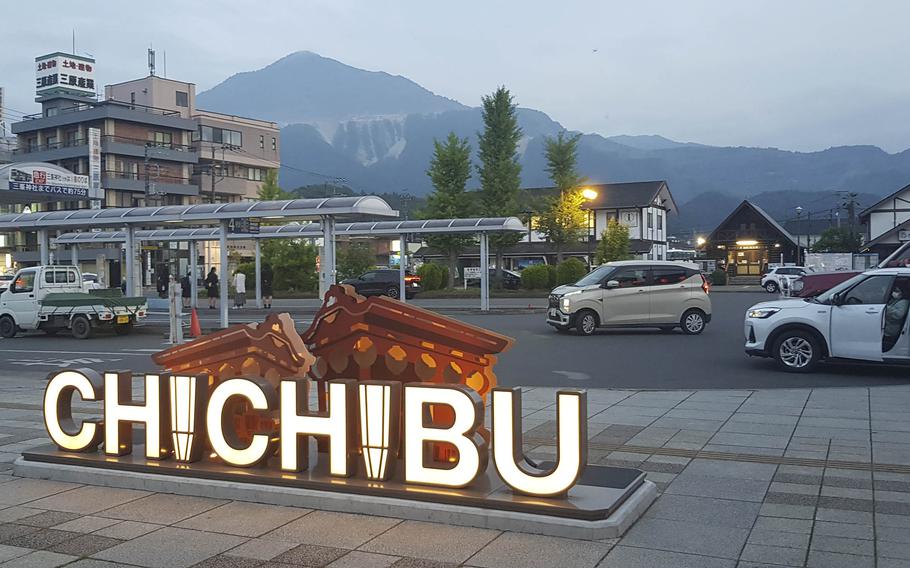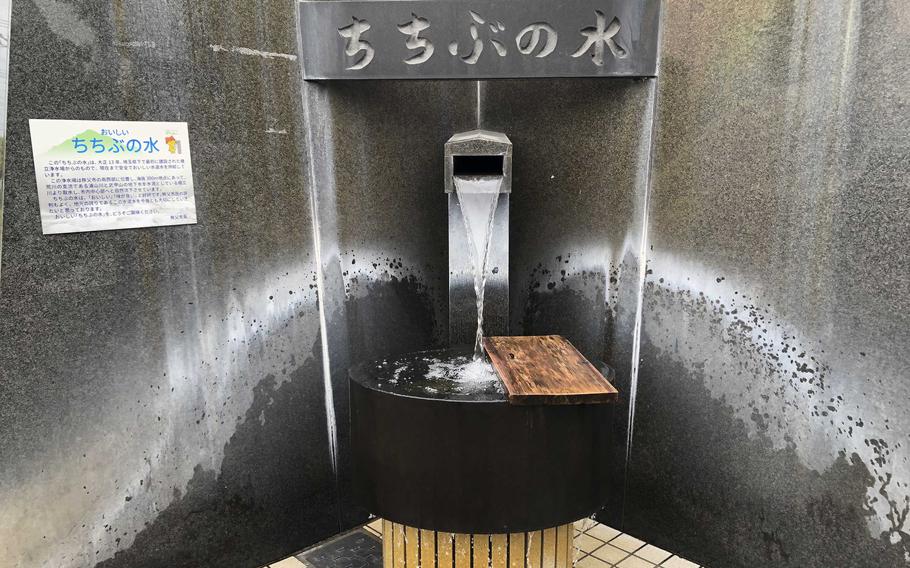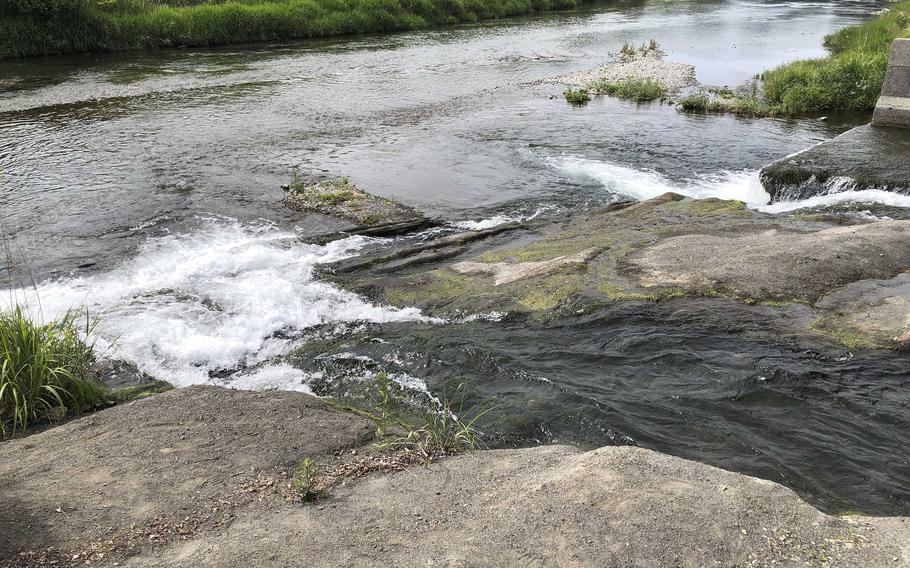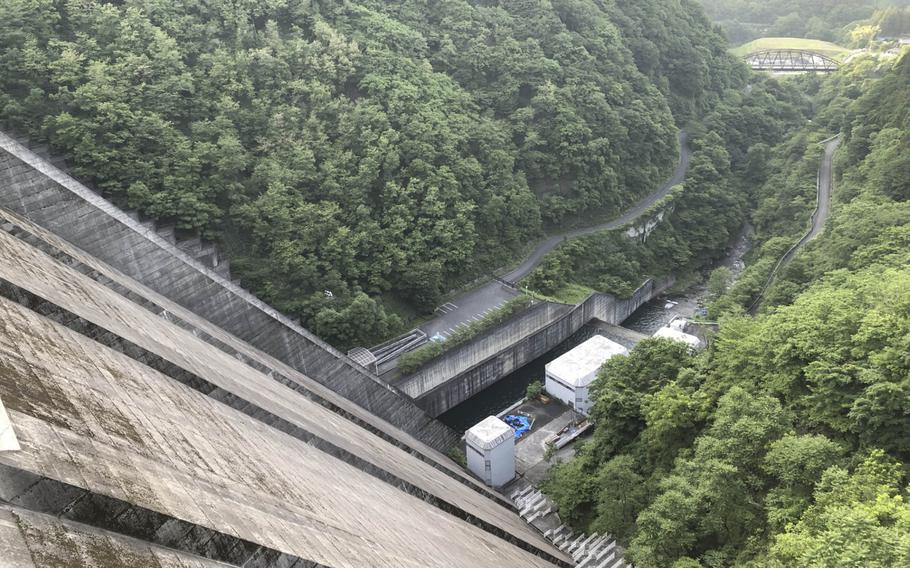
A sign welcomes visitors to Seibu-Chichibu station in Chichibu, Saitama prefecture, Japan. (Juan King/Stars and Stripes)
The peaceful, culturally rich area around the city of Chichibu, about 50 miles north of Yokota Air base in western Tokyo, provides a near-perfect outdoor experience, including day camping, barbecuing and a visit to an impressive dam.
Chichibu, a relatively small city of more than 60,000 residents, is spread across lush landscape surrounded by several forested mountains, including Mount Kobushi, Mount Buko and Mount Mitsumine.
Our first stop over the long holiday weekend in May was at a uniquely styled fountain outside a rest stop where we sampled some of the city’s fresh, tasty water.

Chichibu water is fresh and free to sample at fountains like this throughout the city of Chichibu, in Saitama prefecture, Japan. (Juan King/Stars and Stripes)
The water is free to drink at sources throughout the city. Its source is Mount Buko, whose groundwater feeds rivers and tributaries that supply the Hashidate Water Purification Plant, built in 1924.
A short ride farther into the city led to a secluded area at the Urayamaguchi Camp site, located right next to the Arakawa River.
Also known as the raging river, the Arakawa is well known for dangerous, unpredictable currents and is susceptible to changing directions. Dipping a foot into a calmer section of the river, I found the temperature crisp, but it must be a welcome relief for visitors in the summer.
My son and I spent time walking along and listening to the soothing sound of the splashing river and spotting wildlife there.

Arakawa River in Chichibu, Saitama prefecture, Japan, about 90 minutes north of Yokota Air Base. (Juan King/Stars and Stripes)
The campground provides charcoal grills, and we enjoyed a do-it-yourself barbecue with items we purchased earlier at a city grocery store.
The campsite is open from March through November and can accommodate up to 50 visitors for day camping. Day-use only is just 500 yen, or $3.21.
Cabins for overnight lodging are also available.
After enjoying several hours there, we packed up and drove up to Geopark Chichibu, the birthplace of Japanese geological studies, according to its website.
Near the geopark, we made a stop at Urayama Dam, a concrete gravity dam for flood control dam that also provides the city with water and power.
The dam, completed in 1998, is 511 feet tall, the second tallest in Japan, according to the Japan Water Agency website. The drive to the top is tricky, but free parking is available when you get there.
Its intimidating height overlooks the mountains surrounding the Kanto Plain, and though we missed the open hours, you can tour inside the dam during business hours.

The vew from atop Urayama Dam in Chichibu, Saitama prefecture, Japan, can be a dizzying sight. (Juan King/Stars and Stripes)
The walkway across the top of the dam breast is dotted with small monuments, including a mallet sculpted from hardened volcanic ash. The nearby museum is open during business hours.
Before leaving the city, I purchased a few local snacks and drinks, among them a bottle of locally made and delicious maple cider and maple gummies. Chichibu is known for its Japanese maple trees that yield maple syrup and other maple products.
The serene little city is a great getaway trip, and harbors plenty of sights not very far from the Tokyo metro area.
On the QT
Directions: About a 90-minute drive from Yokota Air Base; about two hours by train to Urayamaguchi camp site: 369-1802 3-1 Arakawa Uedano, Chichibu City, Saitama Prefecture; Urayama Dam: 4041 Arakawa Kuna, Chichibu City, Saitama Prefecture, 369-1801.
Times: The camp site is open for day use until 5 p.m.; overnighters check out by 10 a.m.; the dam is open from 9 a.m. to 5 p.m.
Costs: For the camp site, adults pay 500 yen a day; 300 yen for children. The dam is free to visit.
Food: No food options at the camping site. The dam offers a cafeteria-style dining area inside its exhibition hall.
Information: Online: tinyurl.com/8xan2ue7; tinyurl.com/3f8msrja